Most small businesses struggle to choose the right digital marketing platform. With dozens of tools on the market promising growth, it’s easy to feel overwhelmed.
The wrong choice wastes money and time, while competitors gain market share using streamlined, all-in-one customer engagement platforms that drive results.
This blog breaks down the best digital marketing platforms for small businesses in 2025 so you can confidently select the right solution.
Quick Takeaway (TL;DR Box):
- Small businesses need all-in-one platforms that combine marketing, sales, and reporting.
- Vendasta leads as the best AI-powered solution for small businesses and the agencies, franchisors, and managed service providers (MSPs) who support them.
- Other notable platforms include HubSpot, ActiveCampaign, and Zoho.
Automate your entire customer journey—from first touch to repeat business
What Is a Digital Marketing Platform for Small Businesses?
A digital marketing platform is software that helps small businesses manage marketing tasks all in one place.
Small businesses need these all-in-one solutions because juggling multiple tools is costly, time-consuming, and creates data silos.
So, what is the best digital marketing platform for small businesses?
The best digital marketing platform for small businesses is one that combines essential tools such as email marketing, social media management, SEO, CRM, and client reporting into a single, easy-to-use solution.
It should fit your budget, scale as you grow, and offer automation to save time while helping you attract, engage, and retain customers.
In 2025, the clear winner in the field of marketing automation for small businesses is Vendasta, thanks to its AI-driven features, automation, and ability to centralize marketing, sales, and client management.
Why Do Small Businesses Need a Digital Marketing Platform?
Save Time and Money
Small businesses often juggle separate tools for email, social, SEO, and CRM. This approach is expensive and inefficient.
An all-in-one platform reduces subscription costs and streamlines operations. According to research, businesses leveraging marketing automation and AI save up to 30% on operational costs compared to manual methods.
Automation also helps save money by replacing labor-intensive tasks. For instance, automated email campaigns can do the work of an extra staff member, delivering consistent outreach without adding payroll costs.
Digital marketing platforms save time by automating repetitive tasks like scheduling social posts, sending email campaigns, or generating reports. Instead of spending hours on manual workflows, small businesses can operate more efficiently with streamlined processes.
The time saved can then be reinvested into higher-value activities such as improving customer service, building stronger client relationships, and focusing on business growth initiatives.
Centralize Marketing, Sales, and Client Management
Using one platform for email, another for CRM, and yet another for reporting creates data silos, confusion, and errors.
Information often gets lost between systems, leading to missed opportunities and inconsistent customer experiences.
A centralized digital marketing platform solves this by offering a single source of truth for all customer interactions and campaign data.
This means every team member—from sales to marketing to customer service—can see the same information in real time, reducing duplication and miscommunication.
Centralization also improves reporting accuracy and speed. Instead of pulling metrics from multiple tools and stitching them together manually, a unified client dashboard provides instant visibility into performance across channels.
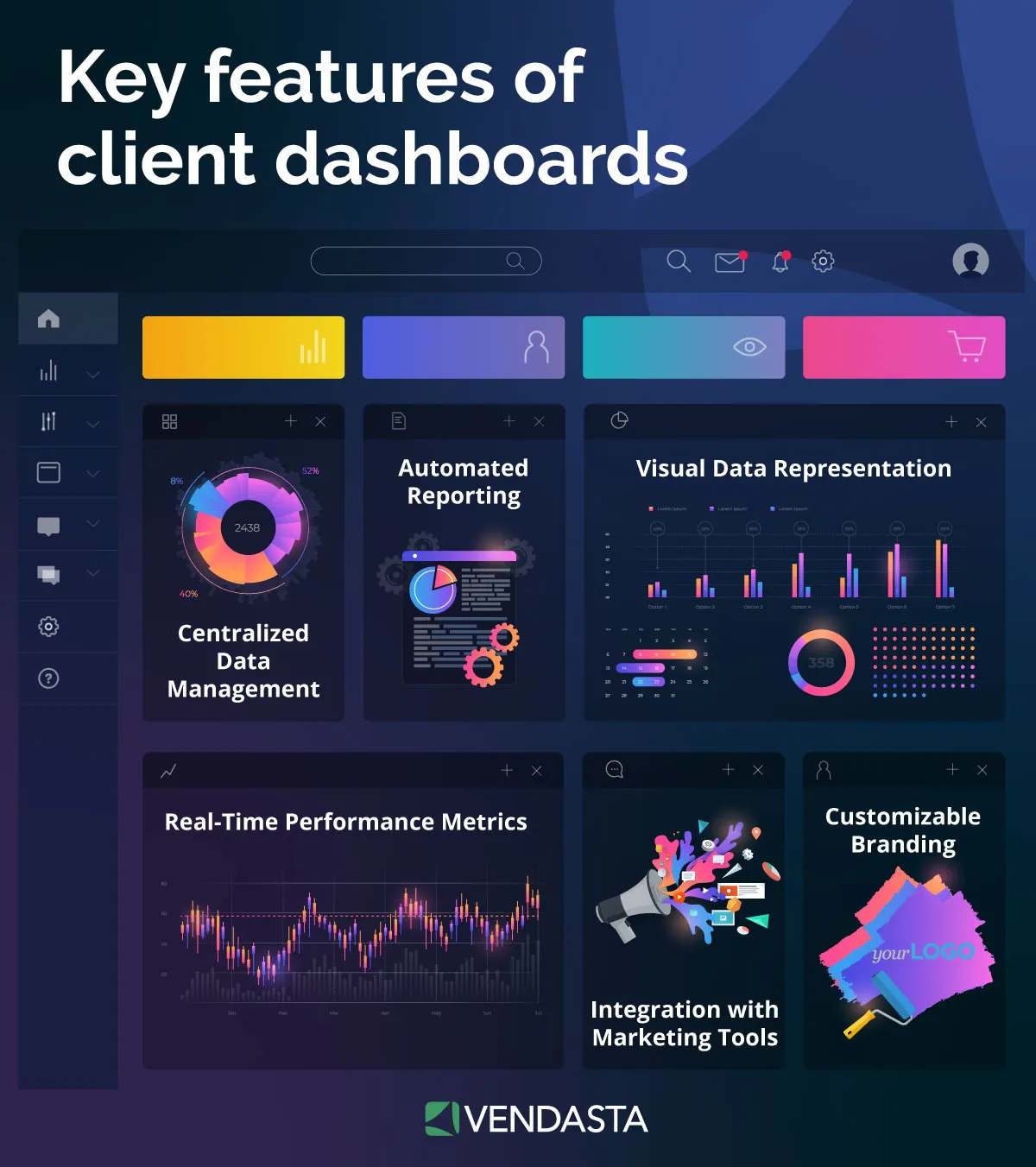
This allows small businesses to make faster, data-driven decisions.
For agencies and consultants, the impact is even greater. Managing dozens of SMB clients across multiple platforms wastes valuable time.
For example, a local agency managing 30 SMB clients can use Vendasta’s Business App and CRM to oversee email campaigns, social activity, SEO results, and CRM data in one login rather than toggling between 10 or more systems.
This not only streamlines operations but also creates a more professional and seamless client experience.
By breaking down silos, businesses gain efficiency, accuracy, and a holistic view of their customers, providing critical advantages when competing with larger players.
Automate Customer Engagement and Reporting
One of the most powerful advantages of digital marketing platforms is the ability to automate customer engagement and reporting.
For small businesses with limited staff and resources, automation ensures that essential tasks are handled consistently—without requiring constant oversight.
AI for small business makes it easier to nurture leads, follow up on customer reviews, and deliver personalized campaigns at scale.
Instead of employees having to manually send every email or chase down feedback, the system handles these processes automatically, giving business owners more time to focus on growth.
In terms of client-facing benefits, automated reporting builds trust and transparency. Clients no longer have to wonder if marketing campaigns are paying off—they receive clear, consistent reports on performance delivered directly to their inbox.
This transparency strengthens relationships and helps prove return on investment (ROI).
Practical examples of automation include:
- Sending review requests automatically after a purchase or service is completed.
- Generating weekly or monthly performance reports without manual input.
- Using AI-powered chatbots or email responders to handle customer inquiries instantly.
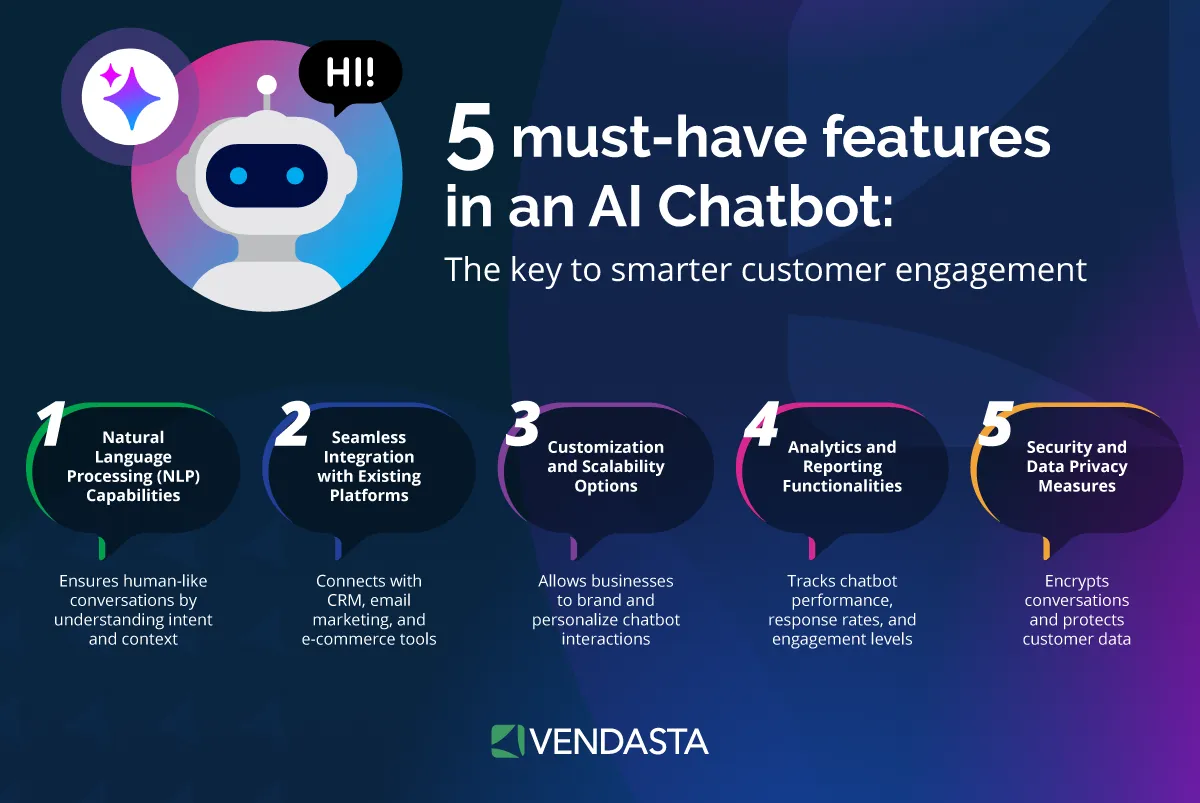
These automations free up human teams to focus on higher-value work like strategy, creativity, and customer care.
Data shows the impact: companies using marketing automation see up to 53% higher lead conversion rates compared to those relying solely on manual methods.
For small businesses, this improvement can make the difference between just surviving and consistently growing.
Scale Operations Without Adding Staff
For many small businesses and agencies, growth often comes with the fear of needing to expand headcount.
Managing five clients may be feasible with a lean team, but scaling up to twenty or more typically requires additional staff.
A strong digital marketing platform changes this equation by allowing teams to grow their book of business without dramatically increasing overhead.
Automation reduces the time spent on repetitive tasks like email campaigns or social scheduling.
White-label services let agencies deliver high-quality solutions under their own brand without having to hire specialized staff for every need.
AI marketing automation workflows add another layer, handling tasks like customer engagement, reporting, and lead qualification around the clock.
Consider this example: a solo digital marketing consultant leverages an AI workforce within a marketing platform to manage 20+ SMB accounts.
Instead of logging into multiple tools and spending late nights handling follow-ups, they can rely on automation for repetitive tasks, white-label services for fulfillment, and AI receptionists for small business to respond to client needs instantly.
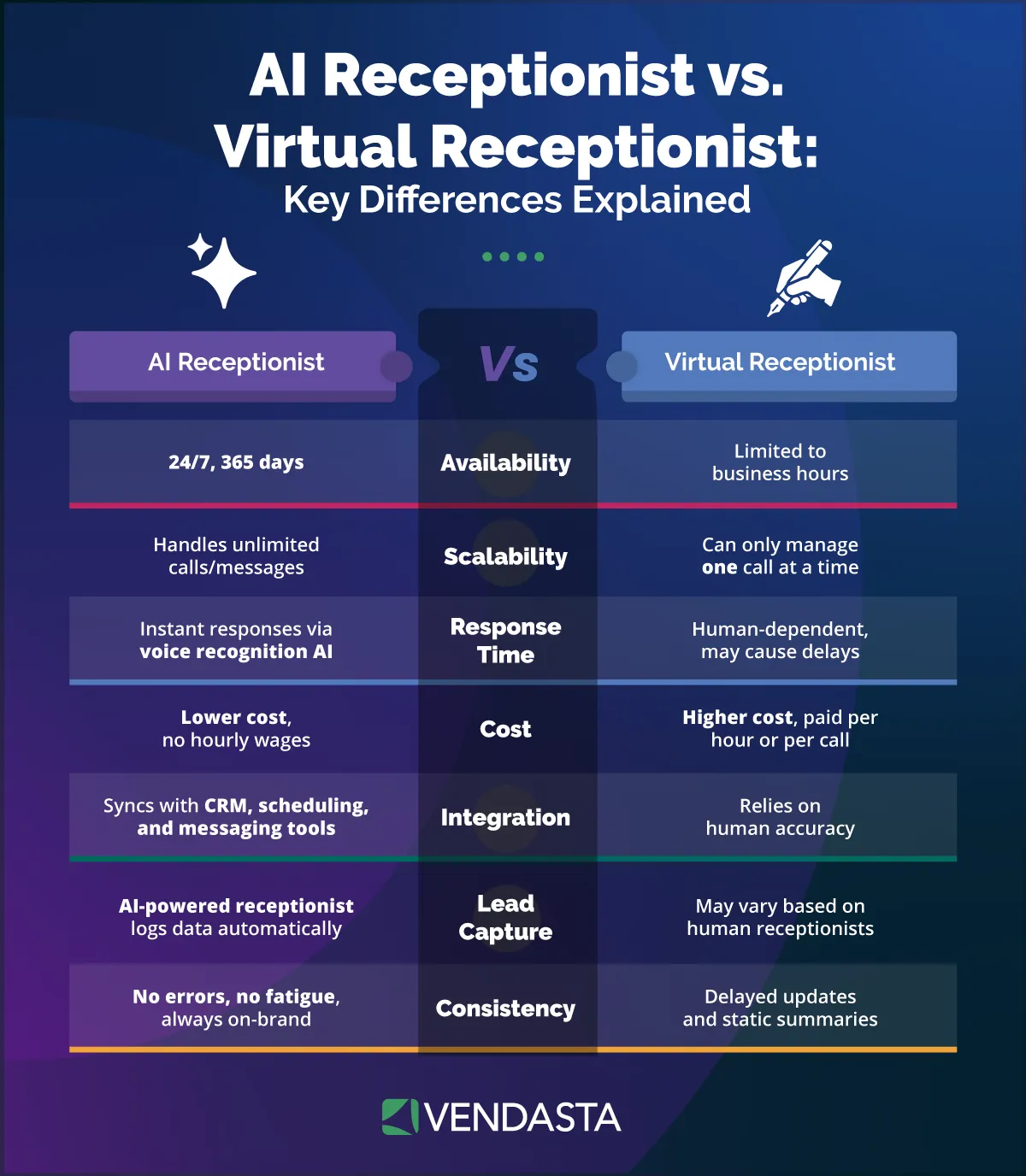
The consultant can serve more clients, deliver consistent quality, and still maintain work-life balance.
Importantly, scaling isn’t just about handling more volume—it’s about sustaining consistent quality across campaigns. A platform with built-in checks, templates, and automated workflows ensures that no client is left behind, even as the business grows.
In this way, a digital marketing platform acts like an extra team member—one that doesn’t take sick days, doesn’t require overtime, and grows alongside the business.
How to Choose the Best Digital Marketing Platform (Step-by-Step Guide)
1. Identify Your Business Goals
Before choosing a digital marketing platform, small businesses and agencies need to clarify their primary objectives.
Without a clear understanding of what success looks like, it’s easy to get distracted by flashy features that may not actually move the needle. This is often referred to as “shiny object syndrome”—investing in tools for the sake of novelty rather than results.
The right platform should align directly with your goals. For example:
- Lead generation: Businesses focused on attracting new customers should prioritize platforms with strong SEO tools, pay-per-click (PPC) campaign management, landing page builders, and social media advertising features.
- Customer retention: If keeping existing customers engaged is the priority, look for solutions that include Net Promoter Score (NPS) management, loyalty programs, automated follow-ups, and personalized engagement campaigns.
- Brand awareness: For businesses aiming to increase visibility, platforms with content distribution, social media scheduling, influencer management, and ad campaign tools will be most effective.
Clear goals also help you measure marketing automation ROI more effectively. If your aim is customer retention, then success should be tied to metrics like repeat purchase rates or churn reduction.
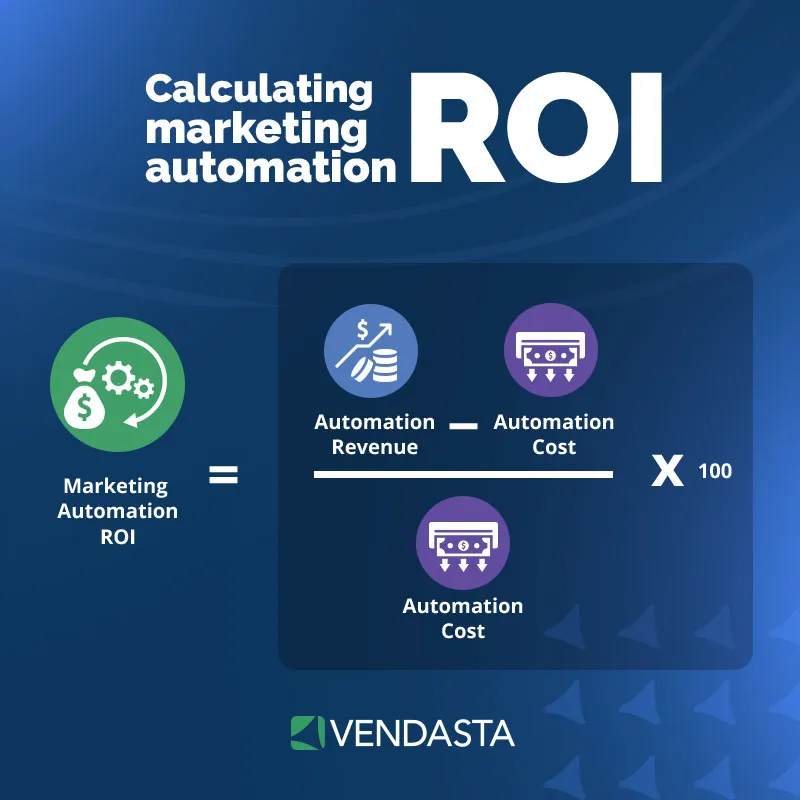
If lead generation is your key priority, performance metrics might include conversion rates or cost per lead.
When evaluating platforms, businesses should also consider whether the tool can grow with them. A platform that only serves one narrow objective may work short-term, but it could force an expensive switch later when your business expands its goals.
Some versatile customer acquisition and engagement platforms, such as Vendasta, are designed to serve multiple objectives across the entire digital marketing customer journey, from awareness to retention.
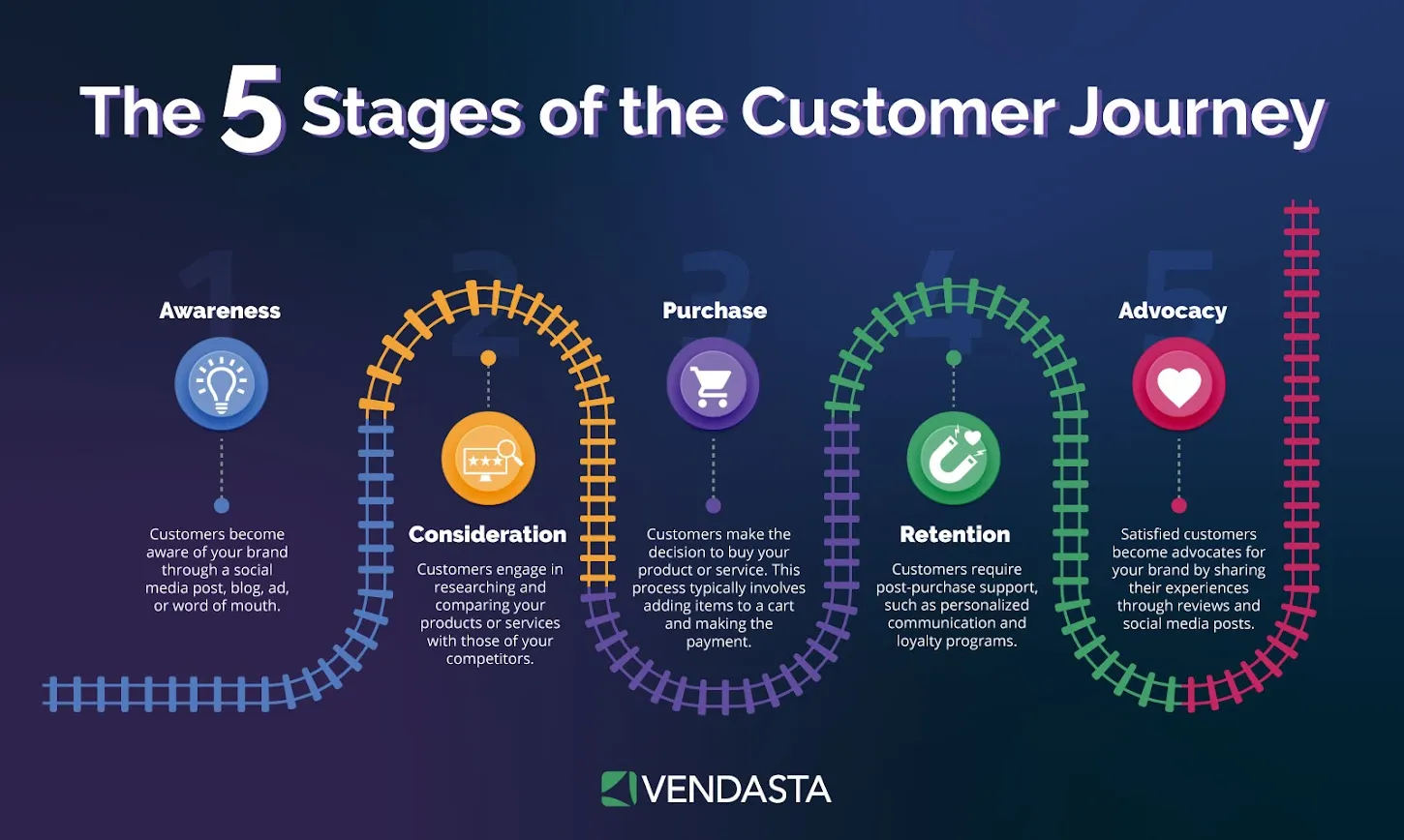
These solutions allow businesses to start with one focus, such as lead generation, and gradually adopt additional features for customer retention and brand growth without switching systems.
By tying platform selection directly to business goals, SMBs and agencies can avoid wasted investments, streamline their operations, and set themselves up for scalable, long-term success.
2. Consider Your Budget
When it comes to SMB marketing, cost is often one of the biggest deciding factors when evaluating digital marketing platforms.
While it’s natural to look for the lowest price, choosing a platform based on cost alone can backfire if the solution doesn’t deliver enough value or requires stacking multiple tools to fill gaps.
That’s why it’s critical to look beyond the sticker price and consider the overall return on investment (ROI).
Pricing tiers generally fall into three categories:
- Under $200/month: Entry-level tools that typically focus on a single function, such as email marketing or social scheduling. These are affordable but can become limiting when businesses need more advanced features or integrated solutions.
- Around $500/month: Mid-tier platforms with stronger automation, reporting, and multi-channel capabilities. These solutions often strike the best balance for SMBs, providing enough power to grow without the cost of enterprise platforms.
- Enterprise-level ($1000+/month): Comprehensive, all-in-one platforms designed for scalability. These are ideal for agencies, franchisors, or growing SMBs managing multiple accounts or needing advanced AI, automation, and integration.
Rather than asking “What’s the cheapest option?”, businesses should evaluate cost in terms of time and resources saved.
For example, a $500/month platform that automates repetitive tasks like lead follow-ups and client reporting could save dozens of work hours each month. If those hours are redirected into revenue-generating activities, the platform could pay for itself many times over.
Using ROI-based thinking makes the decision easier. If a $500 tool brings in $5,000 in new business through improved lead generation and customer retention, the investment is well justified.
Budget planning should also account for scalability. A platform that seems affordable now may become costly if it lacks the features you need as your business grows, forcing you to add more tools or switch providers later.
The best investment is one that balances current affordability with long-term growth potential.
3. Prioritize Features That Matter Most
With so many platforms available, it’s easy to feel overwhelmed by long feature lists.
To avoid decision fatigue, small businesses and agencies should start by creating a feature priority list—a clear breakdown of which capabilities are “must-haves” versus “nice-to-haves.”
This keeps you focused on tools that deliver the most impact instead of getting distracted by extras you may never use.
Key features to evaluate include:
- Automation: Automates repetitive tasks such as email campaigns, review requests, and social posting. This saves time, reduces manual errors, and allows teams to focus on higher-value strategy.
- Reporting: Platforms should offer clear, client-facing reports that simplify performance metrics and build trust. SMBs don’t want spreadsheets—they want visual dashboards and easy-to-read summaries that prove ROI.
- Integrations: Look for platforms that integrate smoothly with existing tools such as accounting software, online booking systems, or CRMs. Strong integrations eliminate silos and help create a unified view of customer data.
- White-label capabilities: For agencies and MSPs, the ability to rebrand tools and reports under your own name could be beneficial. This strengthens your brand, improves professionalism, and enhances client loyalty.
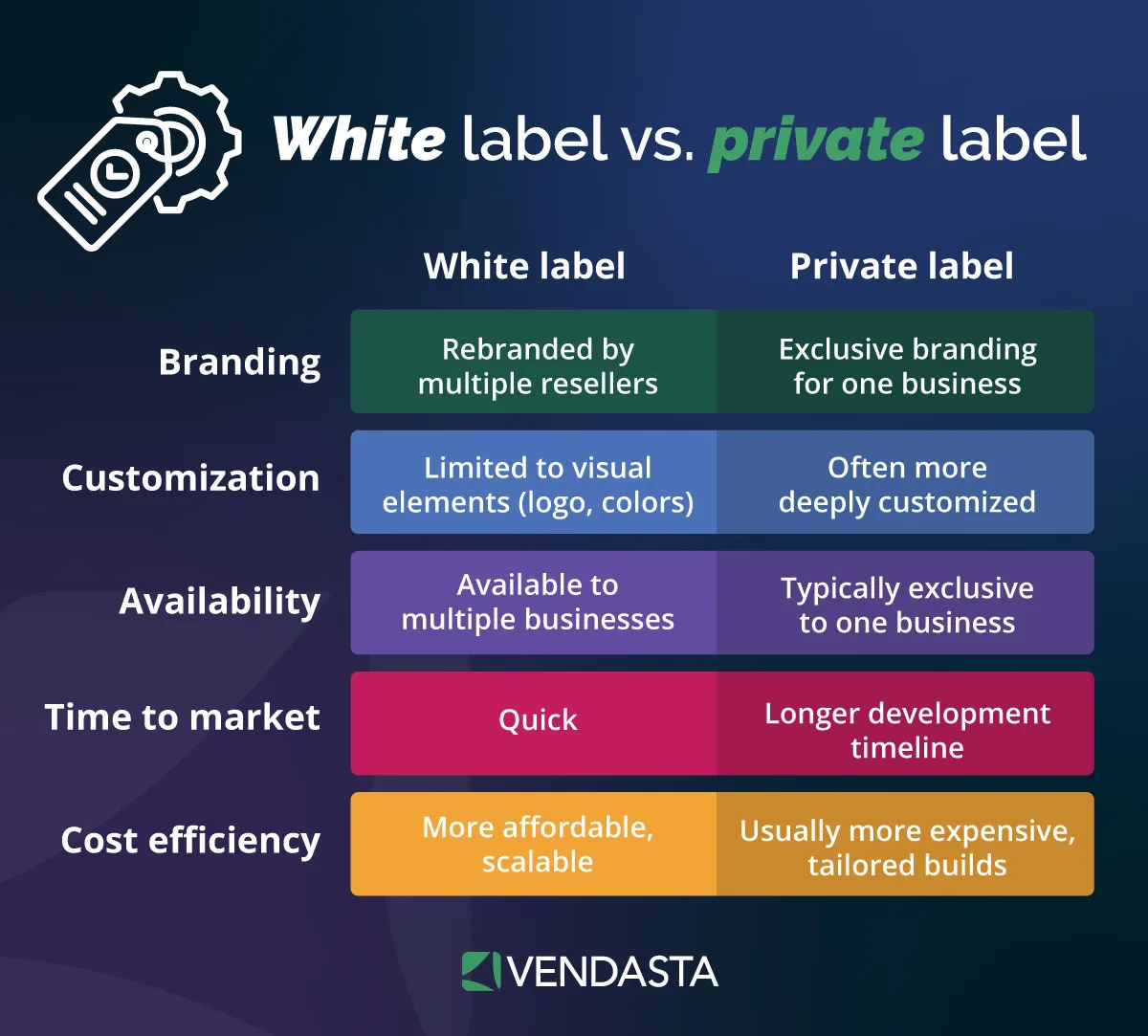
Below are two sample priority lists.
Feature Priority Matrix for a Marketing Agency Owner
The matrix below helps a marketing agency owner evaluate which features matter most when selecting a digital marketing platform. It highlights priority level, core features, why each matters, and concrete examples using Vendasta.
| Priority Level | Features | Why It Matters | Example with Vendasta |
|---|---|---|---|
| Must-Have | White-label capabilities. | Strengthens agency branding and client trust by presenting services and reports under your own brand. | Branded client portal and Executive Report under your own logo. |
| Automation. | Saves time on repetitive tasks like reporting, emails, and review requests, freeing teams for strategy and growth. | AI-powered workflows and automated reporting. | |
| Multi-client management. | Enables managing dozens of SMB clients efficiently from a single login without tool-switching. | Centralized login with scalable client management. | |
| Reporting & analytics. | Proves ROI with clear, client-facing insights and reduces manual data wrangling. | Executive Report delivers automated, transparent reporting. | |
| Nice-to-Have | Integrations. | Connects marketing with CRMs, accounting, and booking tools to eliminate data silos. | Vendasta integrates with popular business systems. |
| AI employees. | Acts as virtual staff to handle lead follow-ups, review responses, and receptionist tasks 24/7. | Vendasta’s AI workforce. | |
| SEO & social tools. | Runs search and social campaigns without stacking extra subscriptions. | Built-in SEO and social posting tools. | |
| Optional | E-commerce tools. | Supports retail and service SMB clients transitioning online with storefront and payments. | Integrations with platforms like Shopify or Wix. |
| Specialized reporting add-ons. | Adds deeper analytics for agencies with niche or enterprise reporting requirements. | Complements Vendasta’s built-in reporting. | |
| Advanced ad management. | Ideal for agencies heavily focused on PPC and paid media optimization. | Can supplement Vendasta with ClickX or DashClicks. |
Feature Priority Matrix for a Franchisor
The matrix below helps franchisors evaluate and prioritize features when selecting a digital marketing platform. It highlights priority levels, the most important capabilities for multi-location brands, why each matters, and concrete examples using Vendasta.
| Priority Level | Features | Why It Matters | Example with Vendasta |
|---|---|---|---|
| Must-Have | Multi-location management. | Centralized oversight of dozens or hundreds of franchise locations for consistent execution and visibility. | Vendasta’s partner dashboard consolidates all franchise accounts. |
| White-label capabilities. | Ensures brand consistency across all franchisee marketing and reporting for a unified customer experience. | Branded portals and reports keep messaging unified. | |
| Automated reporting. | Proves ROI at both the corporate and local level without manual work, enabling faster decisions. | Executive Report auto-generates results by location. | |
| Compliance & brand controls. | Protects brand standards while giving franchisees tools to run compliant campaigns. | Vendasta allows franchisors to set guardrails and permissions. | |
| Nice-to-Have | Local SEO tools. | Helps franchisees show up in local search results and maps to drive nearby traffic. | Vendasta’s reputation management and listings solutions. |
| Centralized ad management. | Coordinates national campaigns while enabling local targeting for maximum efficiency. | Franchise-wide digital ad campaigns managed from one dashboard. | |
| AI employees. | Supports franchisees with review responses, lead follow-ups, and 24/7 customer engagement without adding staff. | AI employees for every location. | |
| Optional | E-commerce integrations. | Useful for franchises selling products or services online to standardize checkout and fulfillment. | Shopify and Wix integrations available through Vendasta. |
| Loyalty & retention programs. | Adds extra value for franchisees by encouraging repeat visits and higher lifetime value. | Customer engagement and rewards add-ons. | |
| Advanced analytics. | Provides deeper insights for corporate leadership to benchmark and compare franchise performance. | Supplements Vendasta’s automated reporting with custom dashboards. |
By clarifying priorities, you can compare platforms more effectively. Here is one more brief example:
- If reporting is your top priority, a specialized solution like AgencyAnalytics may be the right fit.
- If white-label capabilities and automation are most important, Vendasta’s all-in-one AI customer acquisition and engagement platform will provide more long-term value.
Another helpful exercise is ranking features by impact and frequency of use.
Ask: Which features will save the most time or generate the most revenue on a daily or weekly basis? This ensures you invest in tools that address your core business needs rather than rarely used extras.
Ultimately, focusing on features that matter most prevents wasted spending, streamlines AI adoption, and ensures the platform actively supports your growth strategy.
4. Check Scalability
Many agencies start with just a handful of clients, but growth can happen quickly. What works for five accounts often becomes unmanageable at 20, 30, or 50.
Entry-level platforms are usually built for single-user workflows and lack the infrastructure to handle dozens of accounts efficiently. When that happens, businesses are forced to either upgrade prematurely or switch to a new system altogether—a costly and disruptive process.
That’s why scalability should be a core consideration from the start. A truly scalable digital marketing platform should include:
- Multi-client dashboards: The ability to manage many accounts in one login, with permissions that make it easy to toggle between clients without confusion.
- Flexible pricing tiers: Options that allow you to start small but expand as usage increases.
- Workflows and automations designed for scale: Features like bulk campaign scheduling, automated reporting across multiple accounts, and AI-powered engagement tools that function consistently whether you have five or fifty clients.
For example, imagine a solo consultant who starts by managing five SMB clients. Over a few years, their reputation grows, and referrals help expand the client base to fifty.
If they’re using an entry-level tool built for single accounts, they’ll quickly hit a wall, wasting hours switching between platforms, cobbling together reports, and repeating manual tasks.
A scalable platform prevents that bottleneck by handling all accounts in one place, streamlining reporting, and automating repetitive workflows.
Vendasta is built specifically to address this challenge. It supports both ends of the spectrum: mid-sized agencies, such as Elite Web Professionals and Blue River Digital, that need affordable solutions and large franchisors managing hundreds of locations.

With multi-client dashboards, white-label automation, and AI-powered employees, Vendasta ensures that businesses can scale confidently without sacrificing quality or consistency.
The takeaway: choose a platform that not only fits your business today but also grows with you tomorrow because scalability is about maintaining efficiency and results as you expand.
Ask: Does It Offer AI & Automation?
In 2025, AI and automation are competitive necessities. Businesses that rely solely on manual marketing methods struggle to keep pace with competitors who leverage AI to scale faster, deliver personalized experiences, and respond instantly to customer needs.
AI-powered marketing platforms bring clear advantages, including:
- Instant review responses: AI can monitor and reply to customer reviews 24/7, protecting reputation while saving hours of staff time.
- Automated sales outreach: AI sales reps can qualify leads, send follow-ups, and even book appointments, ensuring no prospect slips through the cracks.
- Personalized campaigns at scale: Instead of sending generic emails or texts, AI marketing tools tailor messaging to each customer’s behavior and preferences.
- Automated insights and AI reporting: AI eliminates the need for manual data crunching, generating actionable reports and recommendations without human input.
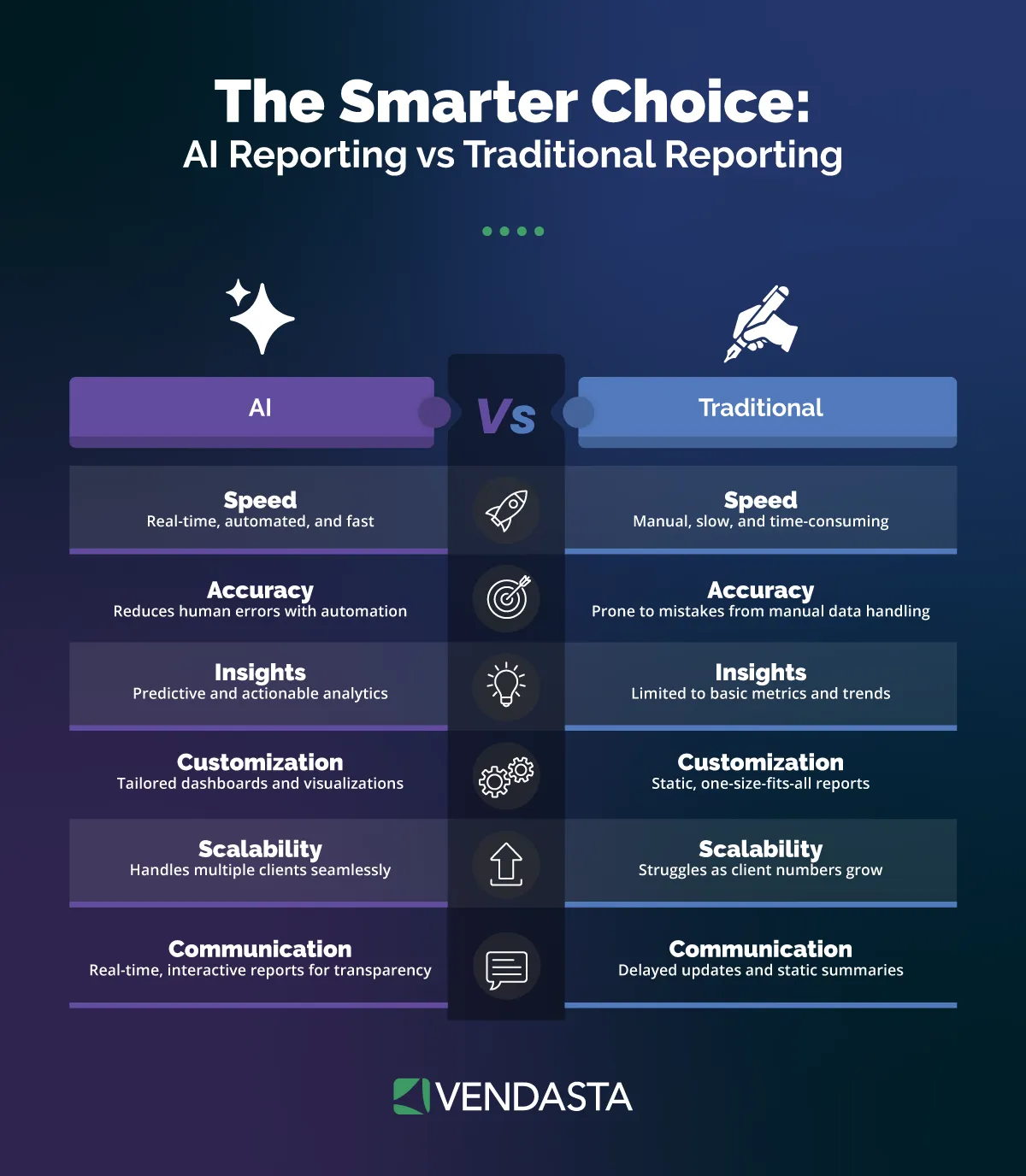
The takeaway is simple: choosing a platform without AI and automation means risking efficiency, visibility, and competitiveness. While manual systems may get by in the short term, they leave businesses vulnerable to faster-moving competitors who automate smarter.
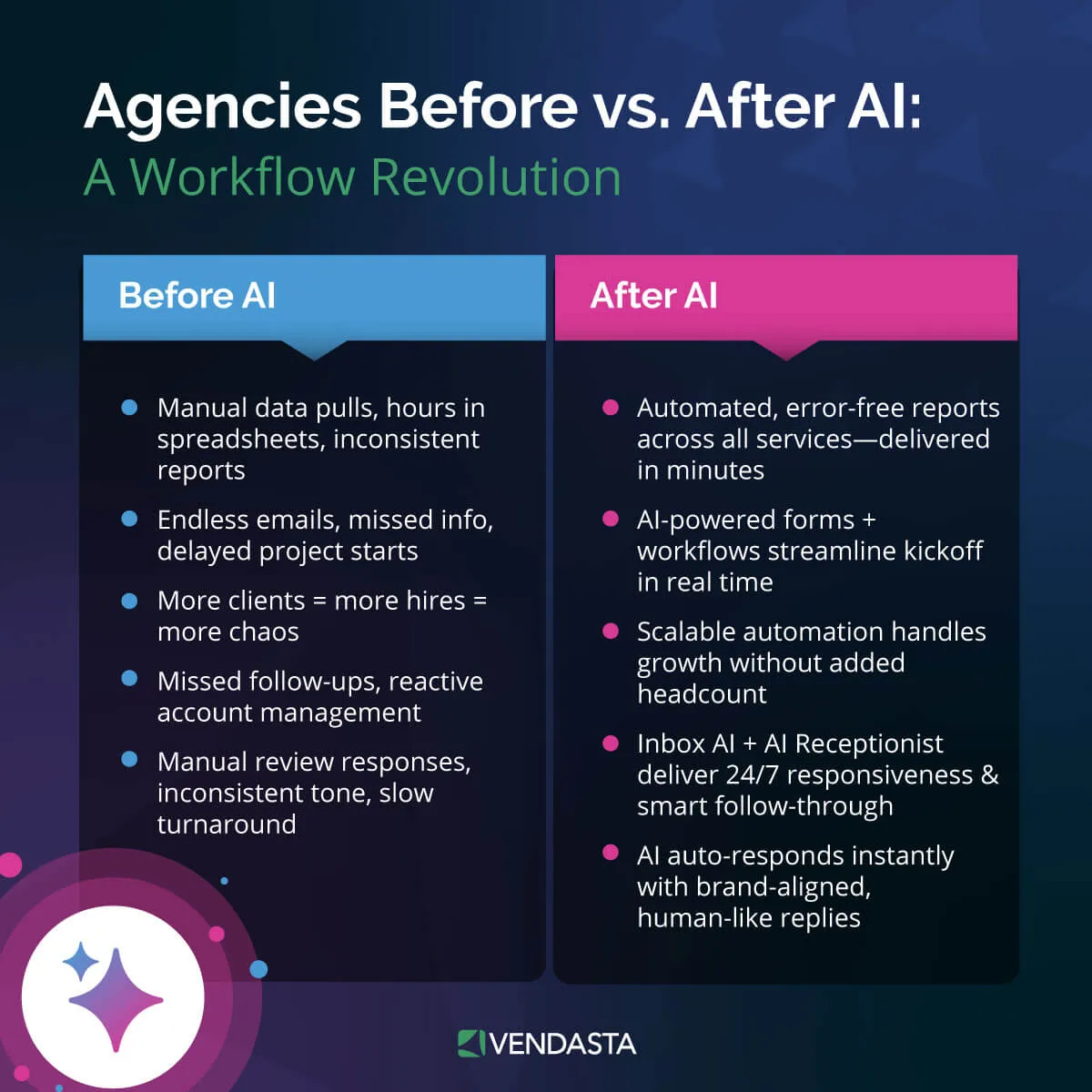
AI & Automation Decision-Making Checklist:
- Does the platform automate key marketing tasks (emails, reviews, reporting)?
Look for automation that reduces repetitive work—such as sending follow-up emails, requesting reviews after purchases, and delivering scheduled reports—so your team can focus on strategy instead of admin tasks. - Can it scale engagement with AI employees?
Beyond basic automation, AI employees can act like virtual staff—responding to inquiries, qualifying leads, booking appointments, and even handling reception calls—providing 24/7 support without adding headcount. - Does it personalize customer campaigns at scale?
Effective platforms use AI to analyze customer behavior and tailor messaging. Instead of generic outreach, each email, SMS, or ad feels relevant, boosting engagement and conversion rates. - Does it generate reports and insights without manual work?
Automated reporting ensures that clients and business owners see real-time performance without hours of data crunching. Look for platforms that also provide AI-powered recommendations, not just raw numbers. - Can it support multi-client or multi-location management?
For agencies and franchisors, scalability is key. The right platform should make it easy to manage dozens—or even hundreds—of accounts without sacrificing performance. - Does it integrate seamlessly with existing tools?
AI is most powerful when connected to CRMs, booking systems, or accounting software. Strong integrations eliminate silos and provide a complete view of customer interactions. - Does it provide predictive insights, not just reactive data?
Leading platforms don’t just tell you what happened—they use predictive AI to foresee customer behaviors, suggest optimizations, and flag risks so businesses can act proactively. - Is it flexible enough to grow with your business?
From a solo consultant to a national franchise, the platform should adapt to your scale, adding features and capacity without forcing you to switch systems mid-growth.
If the answer is “no” to most of these questions, it’s a sign that the platform may hold your business back rather than move it forward.
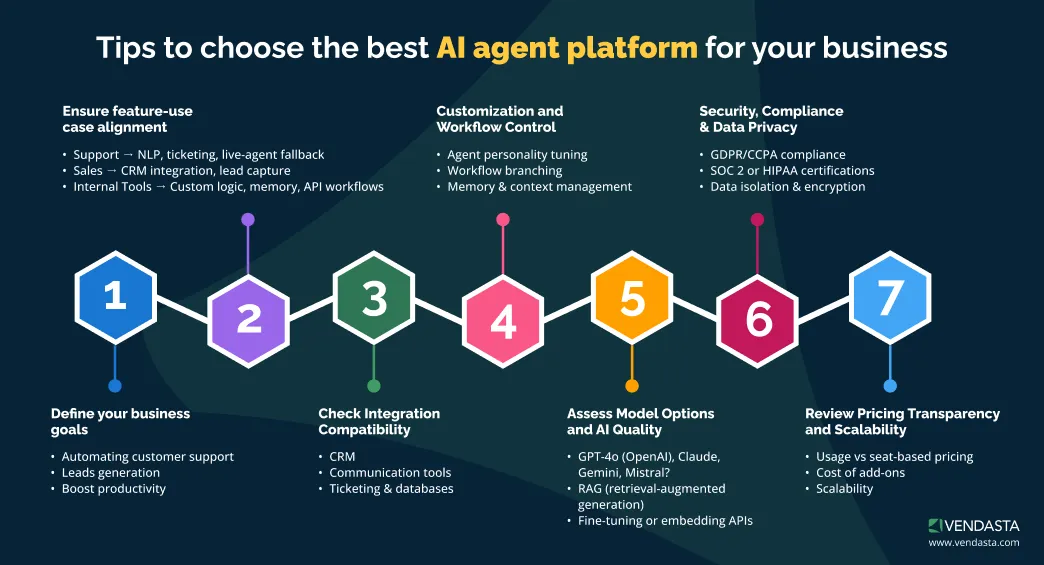
Best Digital Marketing Platforms for Small Businesses in 2025
1. Vendasta – Best All-in-One AI Platform for SMBs & Partners
Summary: Vendasta is an AI-powered customer acquisition and engagement platform that combines marketing, sales, and operations in one place.
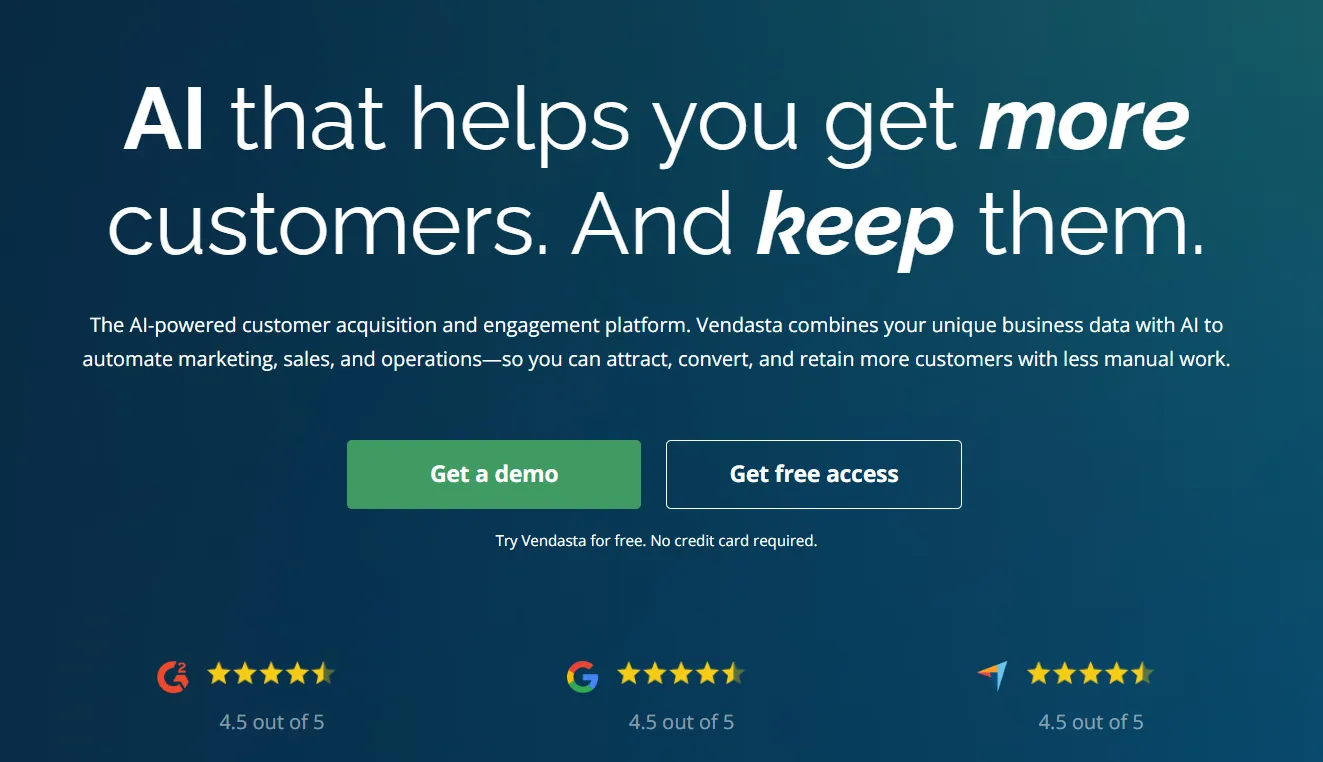
Best for: SMBs, agencies, managed service providers (MSPs), and franchisors looking to consolidate marketing, sales, and operations under one roof with AI and automation that scales as they grow.
Key features:
- Conversations AI: Engage customers 24/7 by capturing leads, booking appointments, and responding instantly across phone, chat, SMS, and WhatsApp.
- Reputation Management: Automate the process of monitoring, requesting, and replying to online reviews, helping businesses build trust, improve ratings, and strengthen local credibility.
- Social Marketing: Keep a consistent and professional presence online with AI-generated captions, scheduled posts, and performance tracking that shows what’s working.
- Local SEO: Optimize local search visibility by managing business listings, tracking keyword rankings, and uncovering new opportunities to be discovered faster by nearby customers.
- Email & SMS Marketing: Run automated, personalized campaigns that nurture prospects, send reminders, and drive repeat business without requiring constant manual effort.
- Executive Report: Deliver clear, branded performance reports automatically to clients, saving hours of manual work while proving ROI and building trust with transparent results.
- CRM and Client Portal: Centralize customer data and interactions in one dashboard, while offering clients a branded portal where they can see campaign performance and recommendations in real time.
- AI Employees: Go beyond simple automation with AI-powered assistants that respond to reviews and act as receptionists to handle calls.
Unique Advantage: Partners can resell services under their brand, while SMBs benefit from enterprise-level tools without complexity.
Pricing: Vendasta’s pricing plan starts at $79 a month. Custom plans available.
2. HubSpot – Best for Scalable Marketing and Sales Alignment
Summary: HubSpot is a robust inbound marketing and CRM platform known for aligning sales and marketing teams.
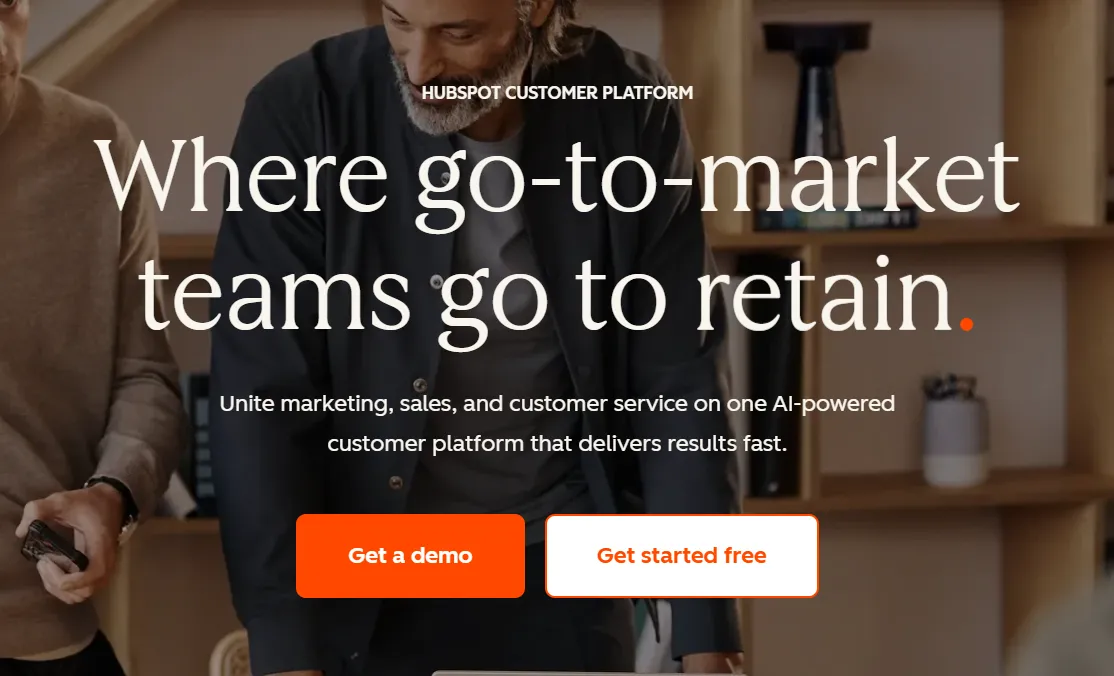
Best for: SMBs ready to scale operations and unify customer data across teams.
Features:
- CRM with detailed contact and pipeline management.
- Email marketing and automation workflows.
- Content management tools for blogs and landing pages.
- Robust analytics and reporting dashboards.
- Wide library of third-party integrations for flexibility.
Drawback: Costs rise quickly as businesses scale into higher tiers.
Pricing:
- Starter Suite: $20/month – Adds simple automation, ad management, and improved reporting.
- Professional Suite: $1,300/month – Expands into advanced marketing automation, personalization, and deeper analytics.
- Enterprise Suite: $4,700/month – Full-scale solution with advanced customization, predictive AI features, and enterprise-level controls.
3. ActiveCampaign – Best for Affordable Marketing Automation
Summary: ActiveCampaign is a budget-friendly platform offering strong automation features.
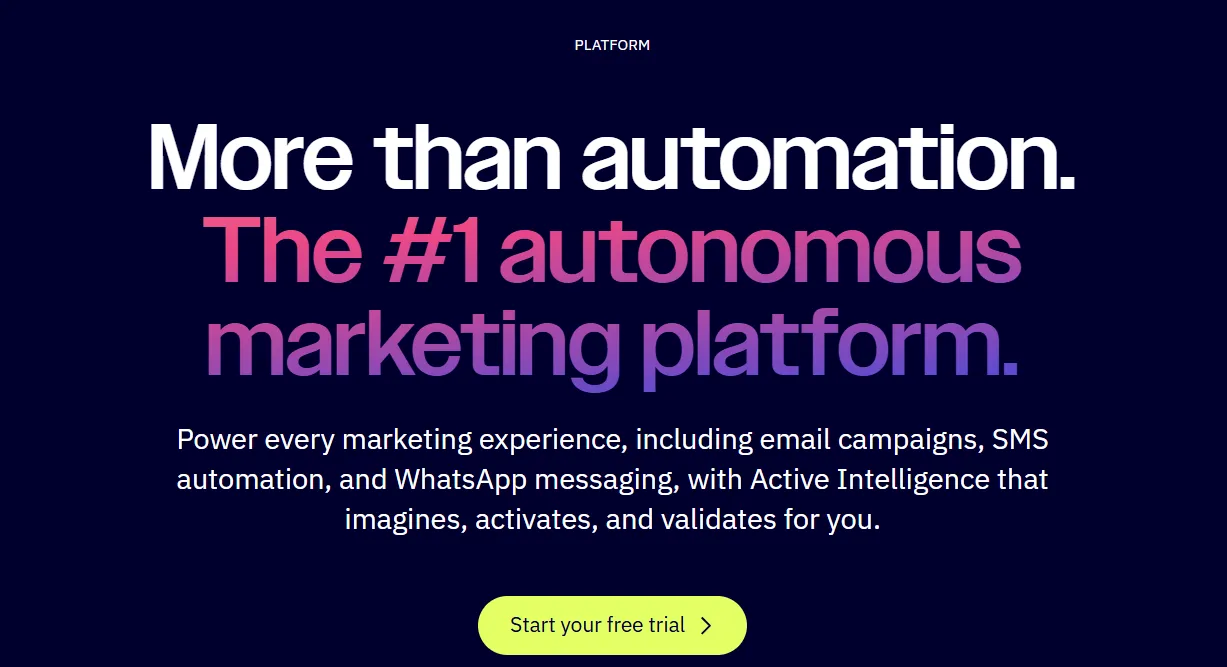
Best for: SMBs looking to automate customer journeys and communications without high costs.
Features:
- Email campaign builder with personalization and segmentation.
- Customer journey automation for nurturing leads.
- Built-in CRM for light sales tracking.
- Predictive sending to optimize delivery times.
- Simple reporting to monitor campaign effectiveness.
Strength: Easy to use for small teams, with powerful automation workflows for the price.
Pricing:
- Plus: Starts at $81/month ($368 billed annually) – Foundational cross-channel automations with customer insights.
- Pro: Starts at $111/month ($398 billed annually) – Full cross-channel marketing orchestration.
- Enterprise: Starts at $215/month ($848 billed annually) – Scalable email and WhatsApp orchestration with enterprise-level support.
4. Zoho – Best for SMBs Wanting Scalability
Summary: A cost-effective suite combining Zoho CRM for sales and customer management with Zoho Marketing Plus for marketing automation, content distribution, and analytics.
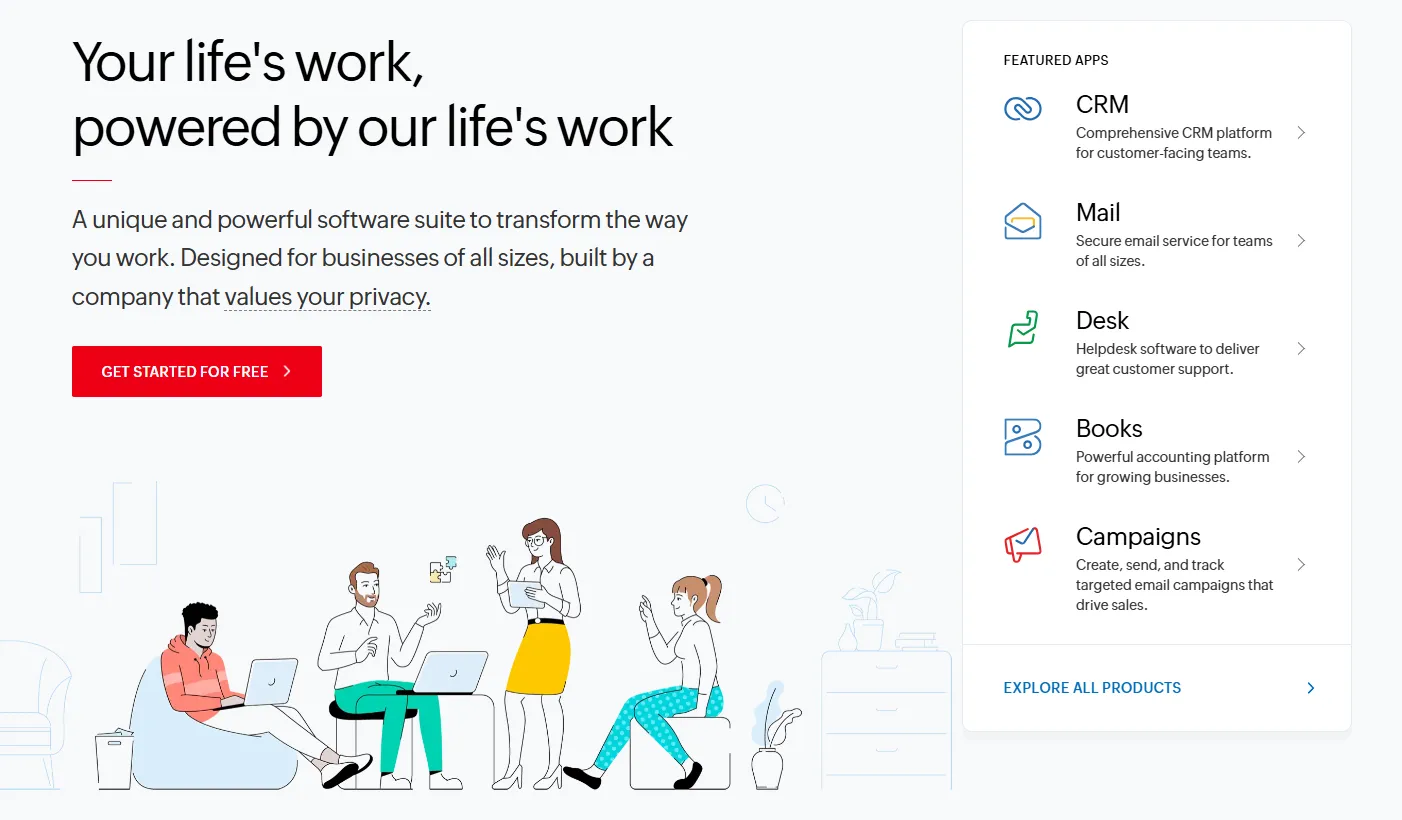
Best for: SMBs that want an affordable, modular solution that scales as they grow.
Features:
- CRM with workflows and sales forecasting.
- AI assistant (Zia) for smarter insights and recommendations.
- Advanced customization for pipelines, processes, and dashboards.
- Email marketing with automation and personalization.
- Social media management and scheduling.
- Event and webinar management tools.
- Content campaign planning and execution.
- Analytics for performance tracking and optimization.
Pricing:
Zoho CRM:
- Standard: ~$14/user/month.
- Professional: ~$23/user/month.
- Enterprise (most popular): ~$37/user/month.
- Ultimate: ~$48/user/month.
Zoho Marketing Plus:
- Base plan: $25/month (1 marketer, 1,000 contacts, 10,000 visitors, 25 webinar attendees, 1 brand, 15 GB storage).
- Add-ons: $10/month per additional marketer (with more contacts and visitors included).
Strength: Affordable entry-level pricing with the ability to layer on advanced features and add more marketers, contacts, or brands as needed. Zoho scales well for both startups and growing SMBs that want flexibility without enterprise-level costs.
5. Constant Contact – Best for Email Marketing Beginners
Summary: One of the most user-friendly platforms for businesses just starting with digital marketing.
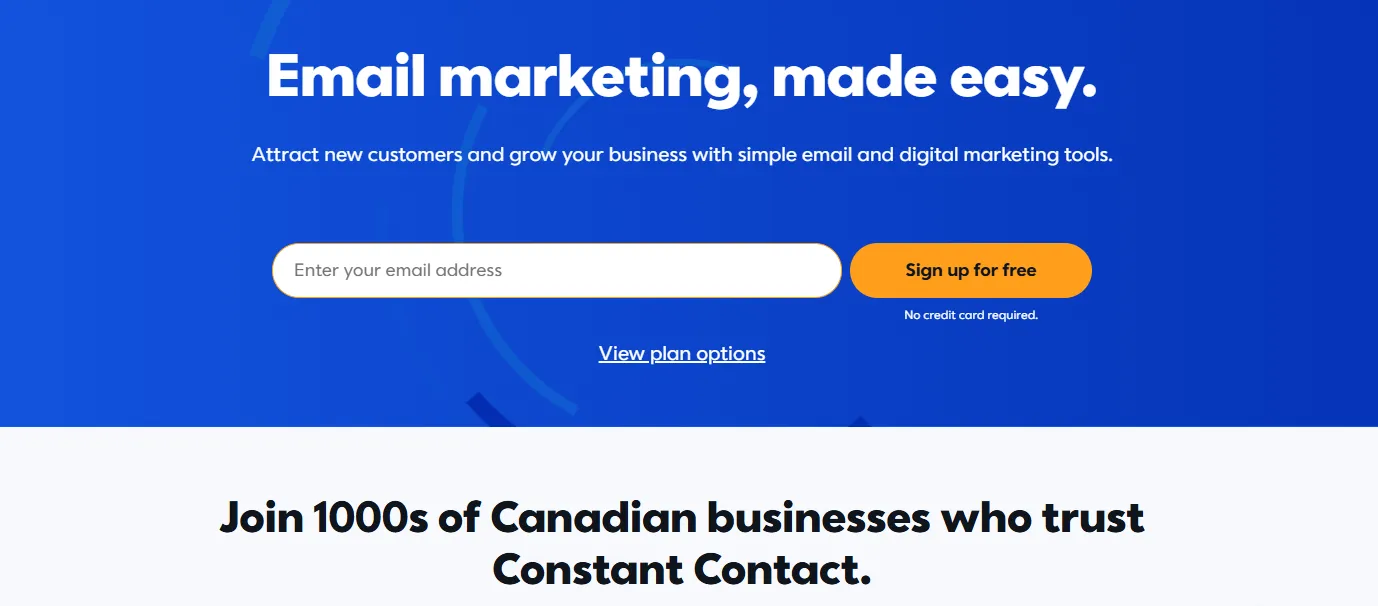
Best for: SMBs with little to no marketing experience who want simple, effective email campaigns.
Features:
- Email marketing to create, send, and track campaigns.
- Hundreds of customizable email templates.
- Social media marketing tools to reach new customers.
- Event marketing to create, promote, and manage events.
- AI assistance to craft better messages quickly.
- Automation for timely and consistent email delivery.
- Integrations with popular business apps.
- List-building tools to grow and manage subscribers.
- Reporting dashboards to track and optimize campaign performance.
Strength: Easy onboarding for non-technical users.
Pricing:
- Lite – $12/month: Ideal for beginners. Includes essential email and social media marketing tools.
- Standard – $35/month: Best for most businesses. Adds stronger automation to help SMBs grow faster.
- Premium – $80/month: Advanced plan for professionals. Includes enhanced automation, advanced segmentation, and additional campaign management tools.
6. Whatagraph / AgencyAnalytics – Best for Client Reporting
Summary: Whatagraph is a reporting platform designed to consolidate marketing data from multiple sources into visual, client-ready dashboards.
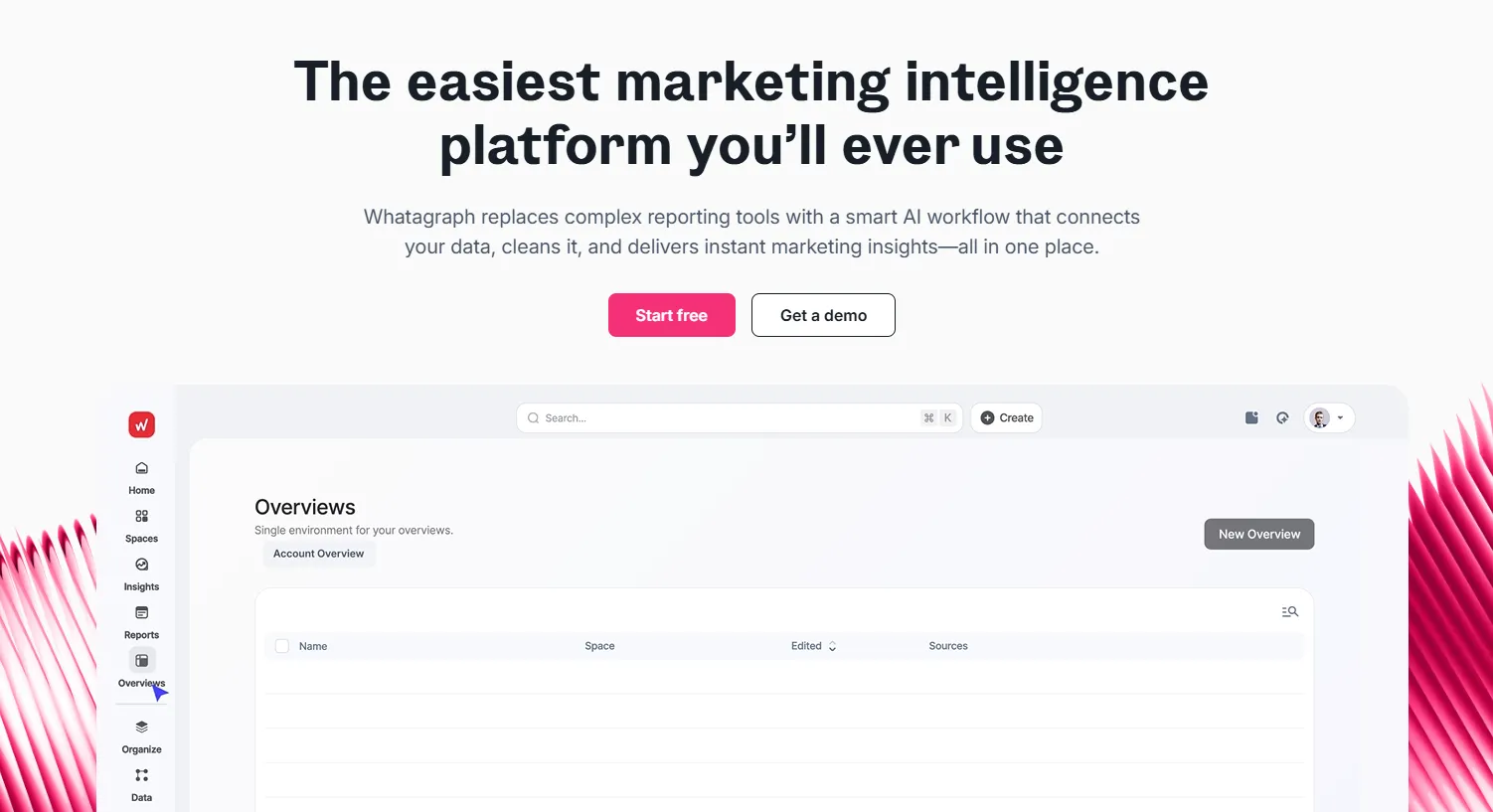
Best for: Agencies and teams managing multiple accounts who need to simplify performance reporting for clients.
Features:
- Essential and advanced integrations.
- Pre-made templates for faster setup.
- Custom data transformations for flexibility.
- White-label reports for client branding.
- Whatagraph IQ for insights and recommendations.
- Dedicated customer support and success management.
Strength: Saves agencies time by turning complex, multi-channel data into easy-to-understand reports that build trust with clients.
Pricing:
- Start – $229/month: For teams consolidating multiple accounts.
- Boost – $579/month: For teams needing advanced data sources.
- Max – Custom pricing: For teams with complex reporting needs.
7. DashClicks – Best for Agencies Specializing in Paid Media
Summary: DashClicks is an all-in-one platform designed to help agencies streamline PPC and paid ad campaign management while scaling client services.
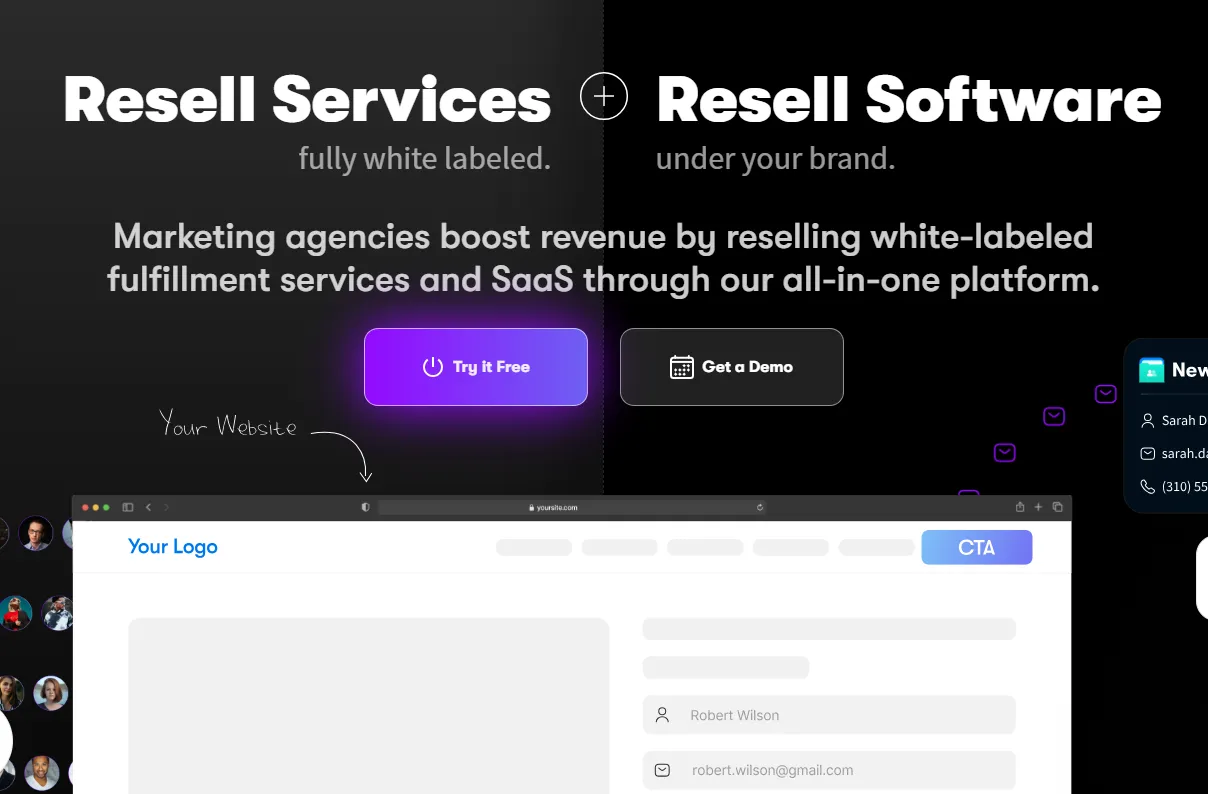
Best for: Agencies running Google Ads, Facebook Ads, and other paid media campaigns at scale.
Features:
- PPC campaign management and optimization.
- Funnel and landing page builders for lead generation.
- White-label apps and reporting to strengthen agency branding.
- Lead tracking and attribution tools.
- Centralized client dashboards for performance visibility.
Strength: Provides agencies with everything they need to launch, manage, and scale paid ad campaigns efficiently under one platform. Forever free access with no subscription fee; pay only for services you use. Includes white-label fulfillment solutions to streamline operations.
Pricing: Pro Plan – $199/month (all apps and features included, one flat price).
8. Wix – Best for SMBs Transitioning Online
Summary: Wix is a website builder and e-commerce platform that helps small businesses quickly establish an online presence with built-in marketing and sales tools.
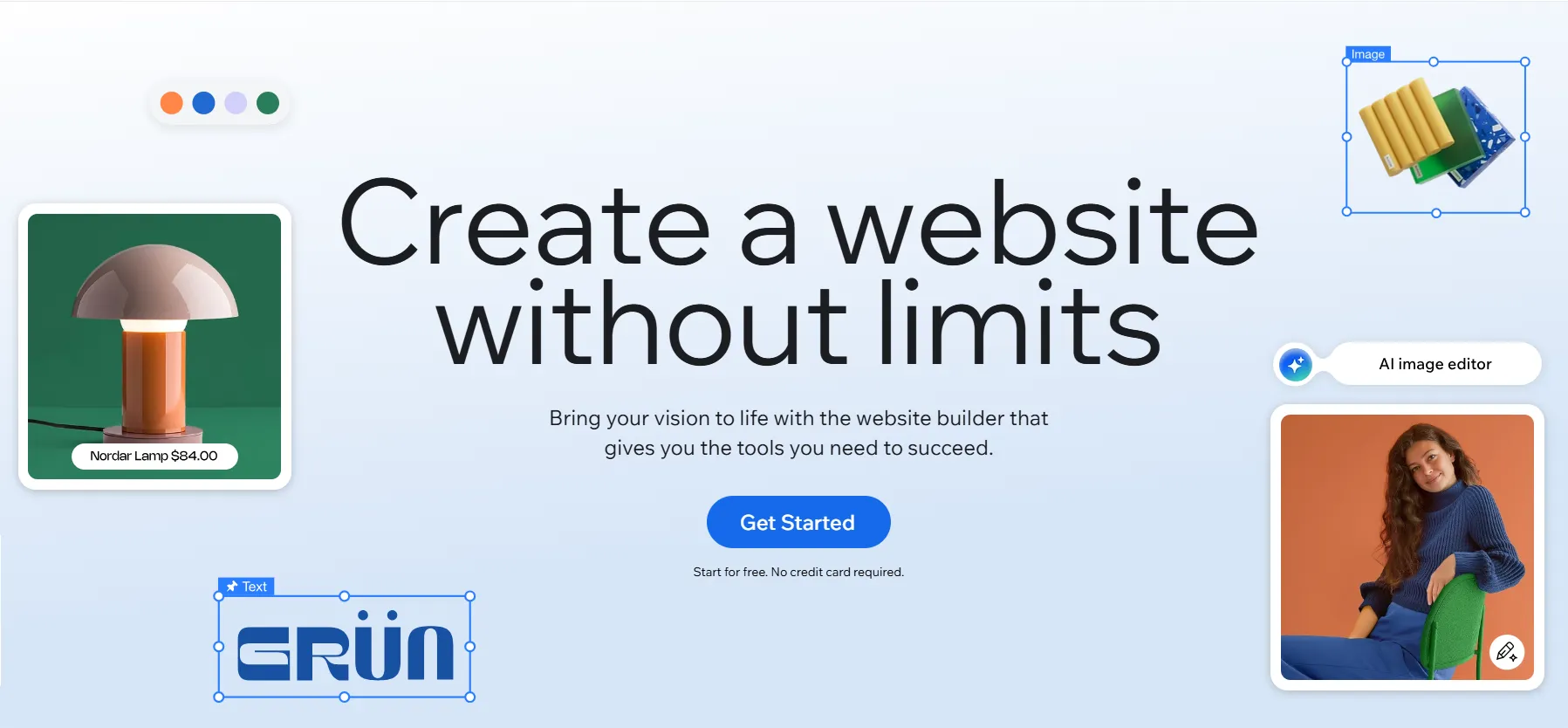
Best for: SMBs moving from offline to online sales or launching their first e-commerce store.
Features:
- Free domain for 1 year (all plans).
- Multi-cloud hosting with reliable performance.
- Built-in marketing suites (light to advanced, depending on plan).
- Accept online payments with integrated gateways.
- E-commerce features for selling products and services.
- Scheduling and booking tools for service businesses.
- Scalable storage and collaborator access depending on plan.
Strength: Provides an affordable, user-friendly entry point for SMBs to create professional websites and online stores without technical expertise.
Pricing (USD, billed monthly):
- Light – $15/month: 2 GB storage, light marketing tools, 2 collaborators.
- Core – $24/month: 50 GB storage, basic marketing suite, 5 collaborators.
- Business – $32/month (Recommended): 100 GB storage, standard marketing suite, standard e-commerce, 10 collaborators.
- Business Elite – $120/month: Unlimited storage, advanced marketing suite, advanced e-commerce, advanced developer tools, 100 collaborators.
Choosing the right platform depends on your goals, budget, and growth stage. The table below compares leading digital marketing platforms for small businesses in 2025, summarizing best use cases, key features, pricing, and each platform’s core strength.
The matrix below helps franchisors evaluate and prioritize features when selecting a digital marketing platform. It highlights priority levels, the most important capabilities for multi-location brands, why each matters, and concrete examples using Vendasta.
The table below compares leading digital marketing platforms for small businesses. It highlights who each platform is best for, their key features, current pricing, and each platform’s core strength. Columns and key row headers are bolded for readability in the WordPress standard editor.
| Platform | Best For | Key Features | Pricing (USD, billed monthly unless noted) | Strength |
|---|---|---|---|---|
| Vendasta | SMBs, agencies, MSPs, franchisors. |
|
Starts at $79/month; custom plans available. | All-in-one AI-powered platform with white-label options, built for SMBs and partners. |
| HubSpot | SMBs scaling marketing & sales. |
|
Starter: $20; Pro: $1,300; Enterprise: $4,700. | Robust inbound marketing platform, but can get costly as you scale. |
| ActiveCampaign | SMBs wanting affordable automation. |
|
Plus: $81; Pro: $111; Enterprise: $215. | Powerful automation workflows at a budget-friendly price. |
| Zoho CRM + Marketing Plus | SMBs seeking scalable, modular tools. |
|
CRM: $14–$48/user; Marketing Plus: $25 base + $10/additional marketer. | Modular and affordable, with flexibility to scale as the business grows. |
| Constant Contact | Beginners in email marketing. |
|
Lite: $12; Standard: $35; Premium: $80. | User-friendly and ideal for SMBs just starting digital marketing. |
| Whatagraph | Agencies needing client reporting. |
|
Start: $229; Boost: $579; Max: Custom. | Saves hours with client-ready reports that simplify multi-channel data. |
| DashClicks | Agencies focused on paid media. |
|
Pro Plan: $199; Free Fulfillment Center (pay per service). | Streamlined ad campaign management with free fulfillment options. |
| Wix | SMBs moving online. |
|
Light: $15; Core: $24; Business: $32; Business Elite: $120. | Affordable, easy-to-use website builder with built-in e-commerce. |
Vendasta: The Leading Digital Marketing Platform for SMBs and Partners
Intelligent AI Employees That Work Like Virtual Staff
Vendasta sets itself apart with AI employees that function like dedicated virtual staff for small and medium-sized businesses.

These AI assistants manage day-to-day tasks such as responding to customer reviews, following up with leads, suggesting campaign optimizations, predicting customer behaviors, delivering insights, and even answering phones through Conversations AI.
The result is 24/7 customer coverage without the cost of hiring additional staff.
White-Label Client Portal and Reporting
One of Vendasta’s most powerful differentiators is its white-label client experience. The Business App provides a branded, easy-to-use portal where clients can log in to see campaign performance, reports, and actionable insights at any time.
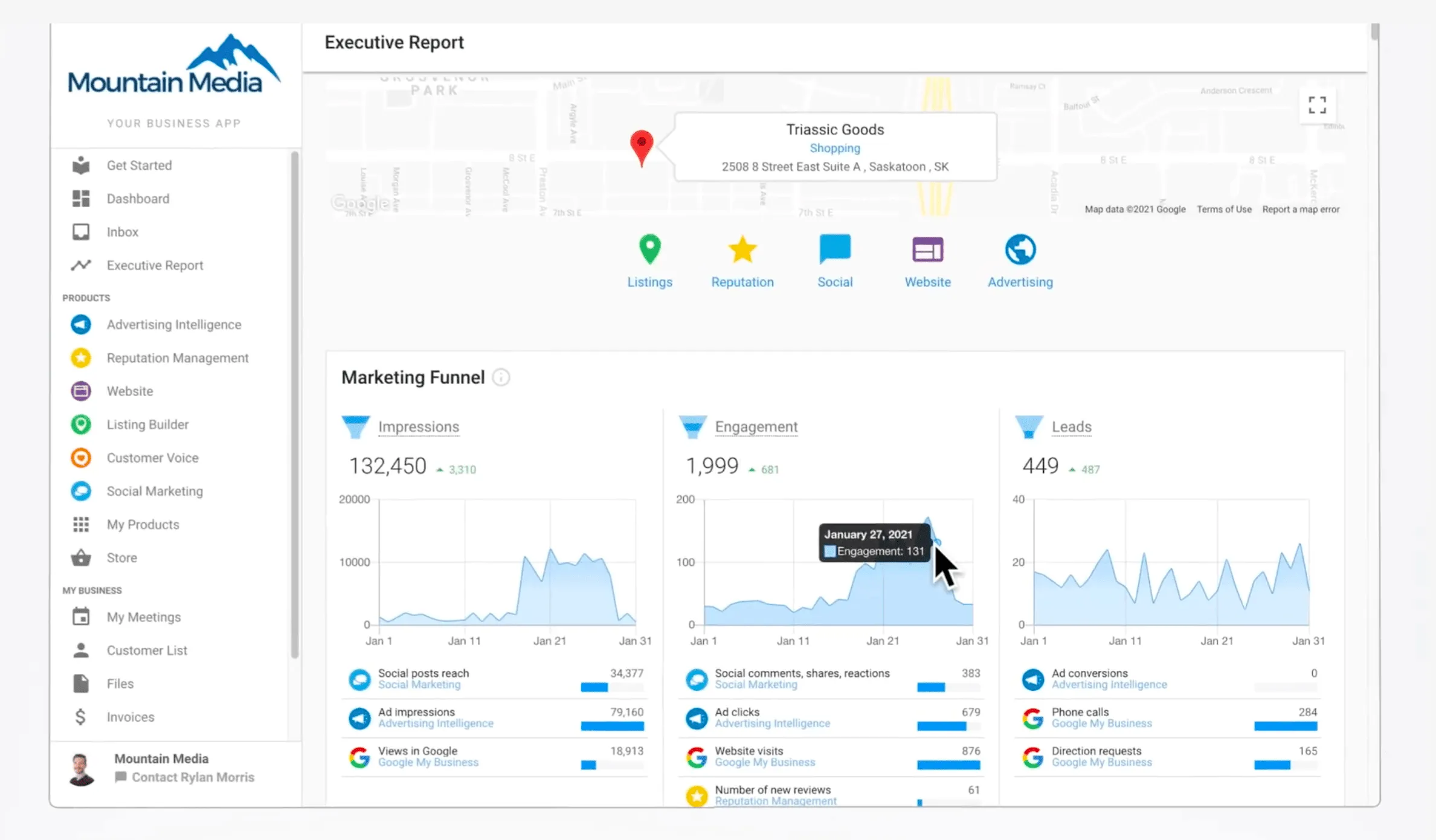
By making marketing results simple and transparent, agencies can strengthen trust and credibility with their clients.
The Executive Report automates client reporting, consolidating performance data across channels into a clear, branded document.
This saves hours of manual work and consistently proves ROI. Agencies and partners can deliver these reports under their own brand, giving them a polished, professional edge over competitors still using clunky, disconnected tools.
Suite of AI-Powered Products and Services
Vendasta offers a comprehensive suite of AI-powered products and services to cover the full spectrum of digital marketing and business operations. Within one integrated platform, users can:
- Run and manage multi-channel campaigns.
- Automate sales, billing, and reporting workflows.
- Deliver personalized customer journeys from first contact to long-term retention.
Vendasta’s services extend beyond software. SMBs and their partners can access a full suite of AI marketing services, including SEO, reputation management, listings management, social media management, digital advertising, and website services.
All of these are delivered through one integrated platform, ensuring campaigns run smoothly without the need for multiple disconnected tools.
Agencies and MSPs can rebrand and resell these services under their own label, creating reliable recurring revenue streams while offering SMB clients enterprise-grade marketing backed by both AI and human expertise.
Built for SMB Growth and Partner Success
Unlike enterprise-first solutions that force small businesses to adapt to complex systems, Vendasta is purpose-built for SMBs and the partners who support them.
Its design eliminates the need for multiple disconnected tools, allowing businesses to centralize marketing, sales, and operations. This simplicity empowers SMBs to focus on growth instead of being bogged down by tech complexity.
Backed by 17+ years of SMB data and enhanced with AI and automation, Vendasta provides insights and workflows tailored to the realities of SMB marketing. From attracting leads to retaining loyal customers, Vendasta equips both SMBs and their partners with the tools to nail customer journey automation.
Final Thoughts: Choosing the Right Platform for SMB Growth
In 2025, small and medium-sized businesses can no longer afford to juggle multiple disconnected tools. The right digital marketing platform isn’t just about convenience—it’s about scalability, efficiency, and long-term growth.
All-in-one solutions powered by AI and automation give SMBs and their partners the ability to attract, convert, and retain customers while keeping operations lean.
When selecting a platform, look for one that doesn’t just solve today’s challenges but can also adapt as your business expands. The ability to scale seamlessly—from a handful of clients to hundreds—ensures you won’t outgrow your tools when growth accelerates.
Want to see how Vendasta helps SMBs scale with AI? Book a demo today and discover how to simplify marketing, sales, and operations in one powerful platform.
Best Digital Marketing Platforms for Small Businesses FAQs
1. What is the best digital marketing platform for small businesses?
The best digital marketing platform for small businesses in 2025 is Vendasta. It provides an all-in-one solution with AI employees, smart automation, SEO tools, reputation management, and reporting—helping SMBs attract, engage, and retain more customers.
2. Which platform is best for agencies managing multiple SMB clients?
Vendasta is the best choice for agencies because it offers a white-label client portal (Business App), automated client reporting (Executive Report), and scalability to manage hundreds of SMB accounts from one dashboard.
3. What is the best digital marketing platform for client reporting?
Vendasta’s Executive Report, Whatagraph, and AgencyAnalytics are leading options for white-label client reporting. They provide automated, visual reports that SMB clients can easily understand.
4. Which digital marketing platform integrates AI and automation the best?
Vendasta stands out with its AI employees that manage sales outreach, customer engagement, and reputation management, automating tasks that typically take staff hours to complete.
5. What is the best all-in-one platform for SEO, social media, and email marketing?
Vendasta and HubSpot are the top choices for all-in-one functionality. Vendasta is unique in offering white-label solutions and AI-driven automation for agencies and SMB service providers.
6. Which digital marketing platform is best for local businesses transitioning online?
Wix, Shopify, and Vendasta are strong options. Wix and Shopify help with websites and ecommerce, while Vendasta helps local SMBs manage reviews, social media, and online visibility all in one place.
7. What’s the best platform for SMBs focused on growth and scaling?
Vendasta and Zoho are excellent for scaling. Zoho offers flexible pricing tiers, while Vendasta allows agencies and SMBs to expand quickly with automated workflows, NPS management, and scalable AI solutions.
8. Do small businesses really need a digital marketing platform?
Yes. A digital marketing platform helps SMBs save time, reduce costs, and compete with larger competitors by centralizing SEO, email, ads, social, and reporting into one system. Without it, businesses risk wasting resources on disconnected tools.
9. What is the best white-label digital marketing platform for agencies?
The best white-label platform is Vendasta. It allows agencies, MSPs, and media companies to resell SEO, social, ads, and reputation management under their own brand. Clients log in through a white-labeled Business App and receive automated reporting branded to the agency.
10. Which digital marketing platforms show ROI most clearly for SMBs?
Vendasta, HubSpot, and AgencyAnalytics are best for ROI tracking. Vendasta’s Executive Report highlights leads, reviews, and campaign results in one dashboard, making it easy for small businesses to see the value.
11. What platform is best for automating repetitive marketing tasks?
Vendasta and ActiveCampaign both excel in automation. Vendasta goes further by offering AI employees that can send emails, respond to reviews, and handle customer engagement without manual input.
12. Which digital marketing platforms integrate best with other business tools?
Vendasta, HubSpot, and Zoho are top choices for integrations. Vendasta connects with QuickBooks, Jobber, PetExec, Zapier, and more, making it ideal for SMBs that rely on industry-specific tools.
13. What digital marketing platform works best for specific industries like home services or pet care?
Vendasta is built for SMB service industries. With integrations into platforms like Jobber (home services) and PetExec (pet care), it helps agencies serve these verticals with marketing automation, reputation management, and AI-powered customer engagement.



